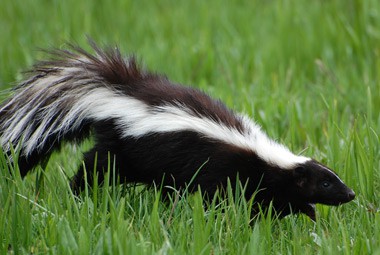
Skunks are small mammals that are about the size of a house cat. They are most known for the potent smelling liquid that they spray from glands that are found at the base of their tail. Striped skunks are found living throughout Missouri.
| Pest Identification | |
|---|---|
| Recognition | Striped skunks have a very distinctive appearance, they have a black body with a white stripe going down their head that divides into two stripes and continues to travel down their body and tail. Their tail is covered in much longer hair than their body. Adult skunks have a body length of 20-30 inches, a tail length of 7-15 inches, and weigh between 2 ½ and 11 1 /2 pounds. |
| Biology | The breeding season for striped skunks starts in February and goes into April. Males will mate with many females; once mating has occurred the males will venture off and the females will be left to care for their young on their own. The gestation period for striped skunks is about 62-66 days, after which 4-7 young are born per litter. Each female skunk typically only has one litter per year. Young skunks are born blind and deaf and are covered in a fine coat of hair. The young will nurse, grow, and mature until they wean at about 6-10 weeks of age. They will remain with their mother until they reach about 1 year of age and are sexually mature. Skunks do not truly hibernate, but as the weather becomes colder they become sleepier and will stay mostly in their den, only coming out on the rare days in which the weather is milder. |
| Habits | Skunks prefer to live along the forest edges, in grassy fields, and in areas of high brush that are close to reliable water sources. They will create their burrows in the ground, in caves, in the crevices of rock piles, in woodpiles, and unfortunately for our Missouri properties underneath of decks, porches, garages and building foundations. Skunks are mostly carnivorous and will feed on things that include: rodents, small mammals, eggs, and insects. In order to find their prey, they will dig into lawns causing damage to landscaping. Also, while digging through trash cans and gardens they will feed on fruits and vegetables. Skunks are probably most famous for the foul smell that they emit. When skunks are threatened they will raise their tail and stamp their feet as a warning. If the perceived threat does not back off they will spray a very potent foul-smelling liquid and if it gets into the eyes of another animal or human can actually cause temporary blindness. Skunks also carry and transmit rabies; they are second only to raccoons. |
| Prevention | Skunks are bad news for Missouri homeowners for several different reasons; they damage lawns and landscaping, they smell, they dig burrows and damage foundations, and carry rabies as well as other diseases. For all those reasons taking steps to try to deter skunks from your property is very important. Here are some steps that homeowners can take to prevent problems with skunks: Do not purposely feed skunks or other wildlife. Fill in holes and gaps found around foundations and along sheds, decks, and garages that skunks could use to begin a burrow in. Make sure that both outdoor trashcans and compost bins are stored a distance away from the outside of your home and that they have secure lids on them. Place fencing material around garden areas; place mesh wire around decks and porches to stop skunks from going underneath of them. |
| Professional | Controlling a skunk problem on your Missouri property should only be handled by professionals. Skunks are not only a smelly problem, but because they carry rabies they are also a dangerous problem. At Rottler Pest & Lawn Solutions our trained experts have the experience and equipment necessary to humanely control and remove nuisance striped skunks from your property through our wildlife control program. Our professionals will inspect your home and property and provide you with the best options available to remove skunks. |

